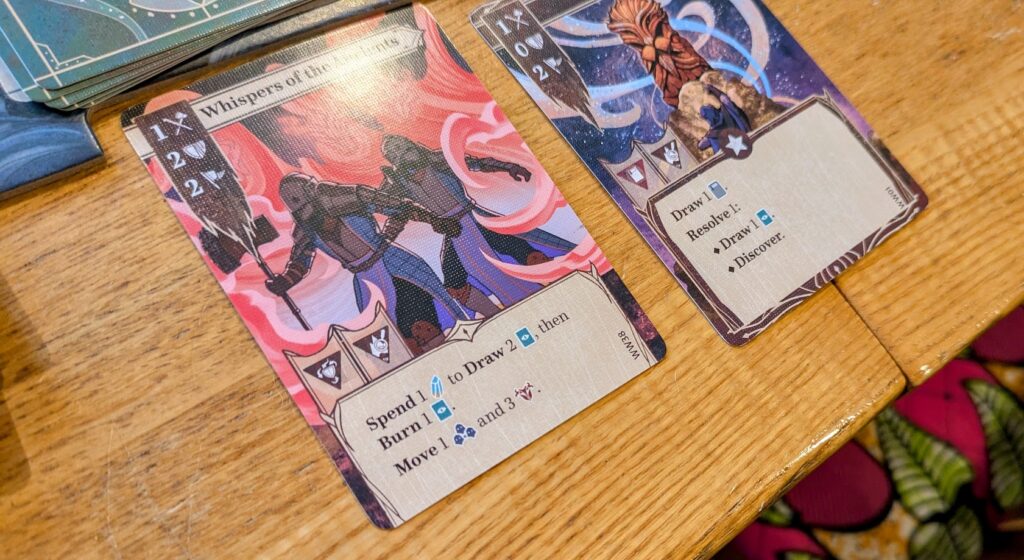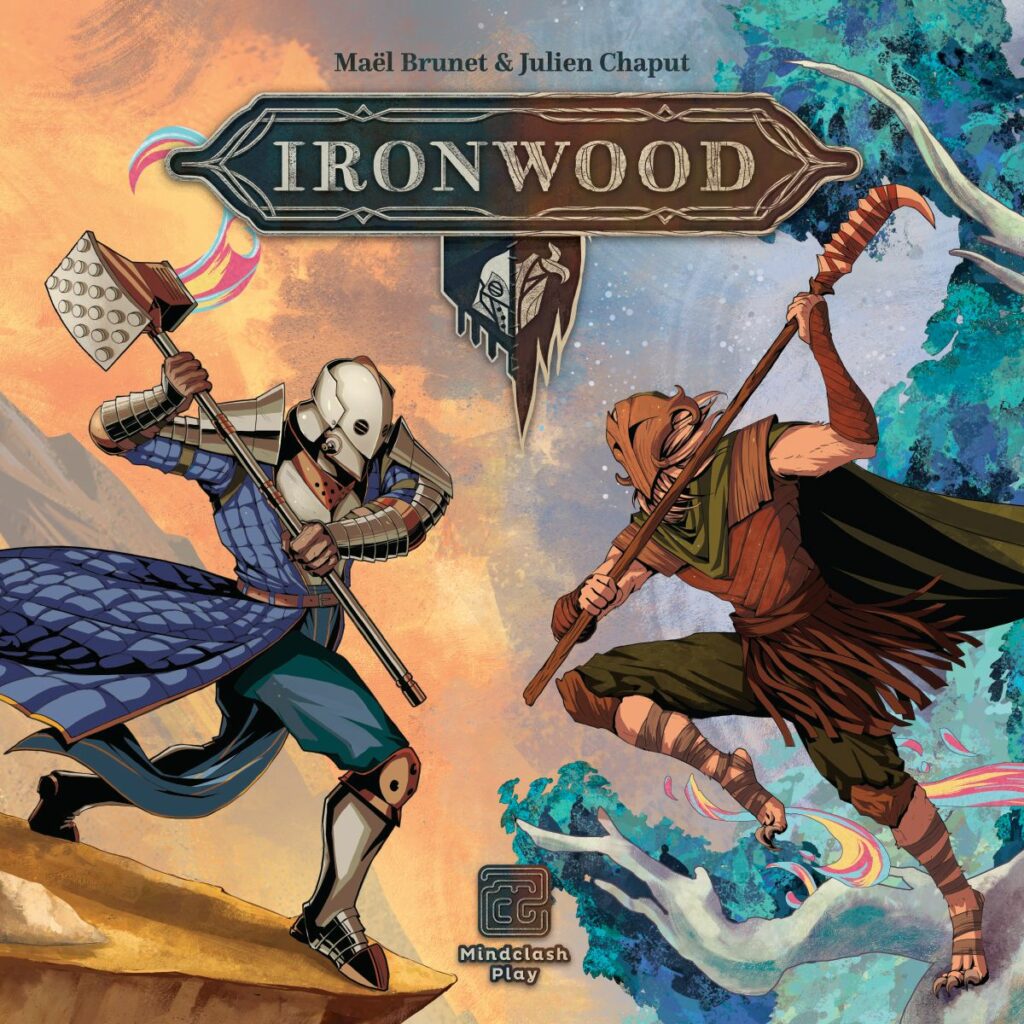Ironwood Review

The best two-player games do one thing especially well. They make you constantly decide between making the best choice to advance your position, and what you can do to impede your opponent. Watergate does it (review here), Twilight Struggle does it, Targi does it (review here) and Chess does it. Ironwood joins the ranks and delivers the dilemma in spades. The struggle between nature and progress is delivered beautifully in the best two-player board game I’ve played in a long time.
From the ground up
When I started writing that opening paragraph I had to choose which games I referenced several times. It struck me that many of the games that spring to mind when I think of two-player fare are spin-offs of existing games. 7 Wonders Duel. Splendor Duel. Cosmic Encounter Duel. Those that aren’t spin-offs are usually small board games or card games. Lost Cities, Battleline, Jaipur, Patchwork, Sky Team, etc. Ironwood bucks both trends by being both a two-player game from the get-go and delivering a full-size board game simultaneously.
Ultimately size doesn’t matter (apparently), but it’s a feeling which permeates the game everywhere. Ironwood is a premium two-player game. Wooden and metal playing pieces in the bog-standard (in fact, only) version of the game you can buy just reinforce that feeling. The setting of the game pits the forest-dwelling Woodwalkers against the industrial mining might of the Ironclad. Both are vying for control of the land of Ironwood and the crystals therein. It’s a pretty cool twist on the ordinary area control game because the two factions never share a space. The Woodwalkers can only stay in the forest spaces while the Ironclad are restricted to the rocks of the mountains, and never the twain shall meet. They just fight where the borders meet.

As is becoming more common in two-player games, the two sides are asymmetric. Each has its own deck of dual-use cards that drive the actions in the game. To paint the game with broad brush strokes, the Ironclad want to create forges in the mountains, harnessing the power of their great drill and building foundations, while the Woodwalkers use visions to locate ancient totems and to escort them back to the outskirts of the forest. It really works, too. Each side feels very different to play, even if the essence of the actions is the same. Movement is movement. Adding warbands is adding warbands. They feel fundamentally different to play as though, and that’s where a lot of Ironwood’s replay value comes from.
Balance
If you’ve played games with a decent level of asymmetry before, you know how important balance is, and how it can often feel missing in your first plays. Ironwood does the same. Woodwalkers – in my experience – felt like the faction who make the early progress, while the Ironclad take longer to build, but then have the potential to snowball later in the game. It’s a bit like Cats vs Birds in Root. The Woodwalkers have a consistent, rhythmic beat to their progress, while the Ironclad feel like spinning up a flywheel. That’s how playing Ironwood felt to me in my first games.

The important thing is the balance, and I’m happy to say that in my experience the game feels very well balanced. I’ve won and lost almost the same number of games as each faction, and while some of that will come down to the quality of the opponent, I feel like any inherent imbalances would have reared their ugly little heads by now. For sure, the Woodwalkers feel easier to do well with, and I’d advise giving them to new players while they learn the game, but with a game or two under your belt, you should have enough of an understanding to make a stand with either faction.
The feeling of a struggle is really well imparted by the game. The unknown locations of the totems mean that no two games will follow exactly the same flow. When combat happens, it uses a system I really enjoy. Each player can play a card from their hand, face-down. The cards are revealed, any bonuses from things like Golems are added, and the damage applied. If the opponent’s attack is higher than your defence, you lose units equal to the difference. However, and this is the fun bit, combat doesn’t end there. Once the punches have been thrown and bloodied noses wiped clean, a second value on the cards is checked – Dominance. As long as you still have a standing unit, you still have skin in the game. The side with the higher dominance can force any remaining losers to retreat, and they decide where to. Spicy!
Final thoughts
I’m really impressed with Ironwood. In every area it could make the effort to deliver something more than the minimum viable product, it does. The components are the sort you’d pay extra for in a deluxe game. The board isn’t tiny just because it’s for two players. It doesn’t feel like a multiplayer game re-imagined for two. The rulebook is, for the most part, excellent too. You can easily learn to play the game without the need for a video. I’m really pleased that Mindclash are offering this ‘Mindclash Play’ line of games, because it’s offering a hand to those who want to play their heavier games without diving in at the deep end.

The card-play in Ironwood is especially good. I love that the cards are used for their actions or their combat values. It forces you to make all kinds of judgment choices all of the time. One really clever part of the game’s design is to give each faction three core cards which are never lost. Even if you wager them in combat, they still return to your hand instead of the discard pile at the end of the round. Why does this matter? The game doesn’t give you enough rope to hang yourself with. You’ll never find yourself with a turn with no actions to take, because you’ll always be able to do the important things. A Splotter game this is not.
It’s worth mentioning that Ironwood comes with a fully-fledged solo bot to play against should you find yourself without an opponent. I tried it out for a game and found it a little fiddly, but far from impossible to run. There are a few flowchart-like actions to work out priority, but on the whole it seemed very smooth. This is a duelling game though, and at its best when you’re sat opposite someone trying to read their mind. It’s easy to learn, offers plenty of strategic and tactical choices, and throws in some clever cardplay and a nice twist on combat. For a touch over £40 when it releases here in retail, for a game that feels so premium, it’s crazy good value. If you have a regular player two, Ironwood is a fantastic game that tickles that part of my brain which Root does for four players. Highly recommended.
Review copy kindly provided by Mindclash Games. Thoughts & opinions are my own.

Ironwood (2024)
Design: Maël Brunet, Julien Chaput
Publisher: Mindclash Games
Art: Villő Farkas, Qistina Khalidah
Players: 1-2
Playing time: 30-60 mins
















